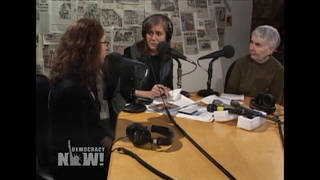
Topics
We just finished what should have been the busiest shopping season of the year, but in lower Manhattan it doesn’tfeel like it.
On White Street in Manhattan, just blocks north of Ground Zero and around the corner from the studio’s of DemocracyNow, a young man stands in the cold, calling to passersby to check out his selection of “pants, sweaters, shirts,coats, hats, scarves, and mittens.” He was hired to work in the stock room of Men’s Express, a discount clothingstore, but recently his job was expanded to include standing outside and attracting customers. Though he shivers inthe cold for as many as eight hours a day, he says that his songs have brought little business.
Meanwhile, just several blocks down, a waiter stands idly by the door of Sparks Restaurant, a family business thathas been in the area for more than 100 years. His tips have dropped to a trickle, but he knows he is lucky: hisemployers have stopped taking a salary so that their staff could keep their jobs.
And then, still further south, only yards from where the Towers once stood, a middle-aged woman waits patiently inher frame store, her faced poised for the customers who rarely come. To help save on the electric bills she can nolonger pay, she has shortened her store’s hours. She is afraid that soon she will have to close her businessaltogether.
Well, it has been nearly four months since the attack on the World Trade Center, but in lower Manhattan, smallbusinesses are still reeling from the impact. Some 10,000 small businesses operate in lower Manhattan, and many arereporting losses of more than 40 percent.
To help stem these losses, a range of private organizations and government agencies have begun offering both grantsand loans to struggling businesses. However, business owners have complained, in a growing chorus, that the grantsare too small and that loan agencies are not approving loans. Since the disaster, for example, the United StatesSmall Business Administration has approved only about one in three applications for disaster loans.
In November, Governor Pataki and Mayor Giuliani appointed members of the Lower Manhattan Redevelopment Corporation,an 11-member agency charged with rebuilding all of Manhattan south of Houston Street. While corporate and politicalinterests are well represented, there are no representatives of small business. Many are beginning to wonder whetherthey have been forgotten.
Today on Democracy Now! in Exile, we will hear from these forgotten business owners.
Guests:
- Soon In Kang, owner of Four Star Nail Salon on John Street.
- Shapoor Noory, owner of coffee and donut cart, Broadway and Franklin.
- Minh Koh, owner of Koh Art Gallery, West Broadway.
- A.J. Cope, bartender at the Raccoon Lodge.
- Lizzy Ratner, Democracy Now! in Exile.












Media Options